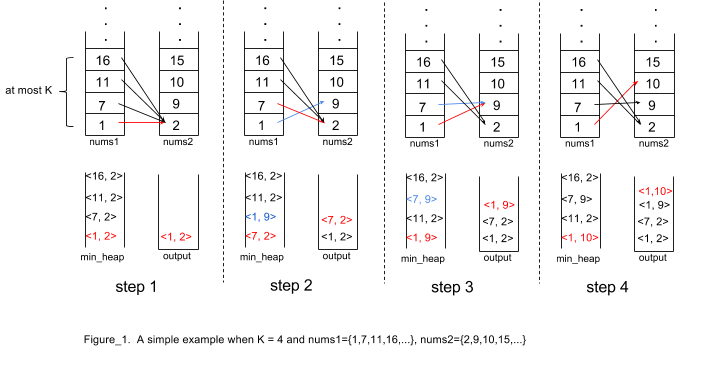[抄题]:
You are given two integer arrays nums1 and nums2 sorted in ascending order and an integer k.
Define a pair (u,v) which consists of one element from the first array and one element from the second array.
Find the k pairs (u1,v1),(u2,v2) ...(uk,vk) with the smallest sums.
Example 1:
Given nums1 = [1,7,11], nums2 = [2,4,6], k = 3
Return: [1,2],[1,4],[1,6]
The first 3 pairs are returned from the sequence:
[1,2],[1,4],[1,6],[7,2],[7,4],[11,2],[7,6],[11,4],[11,6]
Example 2:
Given nums1 = [1,1,2], nums2 = [1,2,3], k = 2
Return: [1,1],[1,1]
The first 2 pairs are returned from the sequence:
[1,1],[1,1],[1,2],[2,1],[1,2],[2,2],[1,3],[1,3],[2,3]
Example 3:
Given nums1 = [1,2], nums2 = [3], k = 3
Return: [1,3],[2,3]
All possible pairs are returned from the sequence:
[1,3],[2,3]
[暴力解法]:
每个搜索一遍
时间分析:n^2
空间分析:
[优化后]:
时间分析:n
空间分析:
[奇葩输出条件]:
[奇葩corner case]:
[思维问题]:
[英文数据结构或算法,为什么不用别的数据结构或算法]:
res添加数组应该写成:res.add(new int[]{cur[0], cur[1]});q用的方法是offer/poll
[一句话思路]:
因为第一列的值都可能是最小的,所以先加第一列, 然后用q做bfs
[输入量]:空: 正常情况:特大:特小:程序里处理到的特殊情况:异常情况(不合法不合理的输入):
[画图]:

[一刷]:
cur[2]是个数,用于控制dfs的退出(a,b)->a[0]+a[1]-b[0]-b[1] 表示2个组的比较,所以是自己和自己相加
[二刷]:
- if (cur[2] == nums2.length - 1) continue;用于换下一个条件
[三刷]:
[四刷]:
[五刷]:
[五分钟肉眼debug的结果]:
[总结]:
bfs的依据是:cur1[0]不变,cur2加一
[复杂度]:Time complexity: O(n) Space complexity: O(n)
[算法思想:迭代/递归/分治/贪心]:
[关键模板化代码]:
[其他解法]:
[Follow Up]:
[LC给出的题目变变变]:
[代码风格] :
[是否头一次写此类driver funcion的代码] :
[潜台词] :

class Solution { public List<int[]> kSmallestPairs(int[] nums1, int[] nums2, int k) { //initialiazation: result heap List<int[]> result = new ArrayList<int[]>(); PriorityQueue<int[]> q = new PriorityQueue<int[]>((a,b) -> a[0] + a[1] - b[0] - b[1]); //corner cases if (nums1.length == 0 || nums2.length == 0 || k<= 0) return result; //add the first col k nums into q for (int i = 0; i < nums1.length && i < k; i++) { q.offer(new int[]{nums1[i], nums2[0], 0}); } //do bfs under while loop //add the first element to result, expand to other elements while (result.size() < k && !q.isEmpty()) { //add the first to result int[] cur = q.poll(); result.add(new int[]{cur[0], cur[1]}); //exit when cur[2] exceeds if (cur[2] == nums2.length - 1) continue; //expand q.offer(new int[] {cur[0], nums2[cur[2] + 1], cur[2] + 1}); } //return return result; } }
